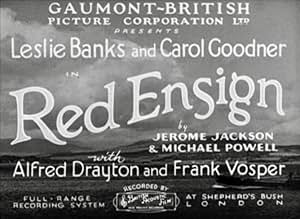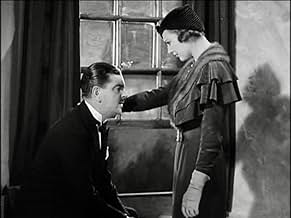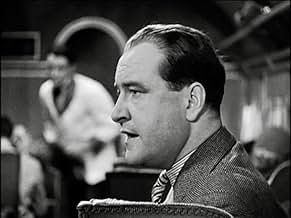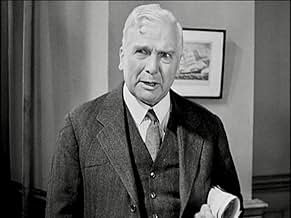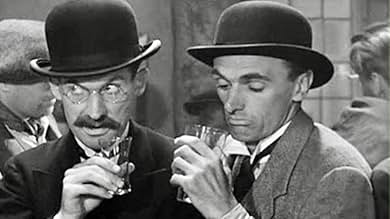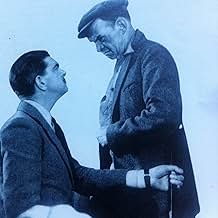Füge eine Handlung in deiner Sprache hinzuDavid Barr is the manager and chief designer of a British shipyard (when we still built ships). The shipyard is in financial trouble but Barr has a design for a new ship that will save them ... Alles lesenDavid Barr is the manager and chief designer of a British shipyard (when we still built ships). The shipyard is in financial trouble but Barr has a design for a new ship that will save them all. Can he get the ship built in spite of the opposition from his own bankers as well as ... Alles lesenDavid Barr is the manager and chief designer of a British shipyard (when we still built ships). The shipyard is in financial trouble but Barr has a design for a new ship that will save them all. Can he get the ship built in spite of the opposition from his own bankers as well as the rival shipbuilders and their infiltrated militants.
- Regie
- Drehbuch
- Hauptbesetzung
- Mr. Lindsey
- (Nicht genannt)
- Police Inspector
- (Nicht genannt)
- Wages Accountant
- (Nicht genannt)
- Mr. McWilliams
- (Nicht genannt)
- Testing Official
- (Nicht genannt)
Empfohlene Bewertungen
I was surprised to see myself caught up in the story. The crusading hero (David Barr, played by Leslie Banks) has to be one of the most abrasive the screen has seen: a monomaniac who barks out insults at everyone around him in clipped tones and then wonders why he isn't more popular. I won't even comment on his moral code... And yet, there's no doubt I was on his side. I was even conned into liking him. By the end of the film the most critical thought I could manage was, `Well, it would be a pity to lose the British shipping industry just because its champion is such a jerk.'
Many critics (well ... three, to my knowledge) see the British shipping industry as a metaphor for the British film industry. I'm not sure if they're right or not. But `Red Ensign' is an argument for Britain's quota system in another sense: it shows that directors of obvious talent were allowed an apprenticeship, making films that, on examination decades later, really aren't so bad.
Powell scholars refer to this as the first real Powell movie, in particular when dealing with the central character of David Barr (Leslie Banks), the visionary shipbuilder who decides to take a great personal risk with his company in a time of depression. Reportedly, Barr's efforts to push shipbuilding in Britain mirror Powell's own perceived efforts to push the British film industry at the same time, identifying with the main character on a level he hadn't felt for any other character he'd directed since he'd started. The irony, though, is that there are also parallels to how Barr is willing to do things that come close to how Banks' character in The Fire Raisers worked. But, that's another topic entirely.
Anyway, England is in Depression with the rest of the world, and the merchant marine is degrading with the times as foreign subsidized ships are dominating the seas, manifested by Manning (Alfred Drayton), a British national who uses foreign crews on foreign built ships to make his money. Barr's ambitious plan to build 20 ships of his new design is met with resistance by his board of directors, mostly Lord Dean (Frank Vosper), Barr's efforts only saved by some sweet words to June (Carol Goodner) who owns most of the shares. The bulk of the story is really focused on these corporate level efforts to fund the project which are kept at a high enough level to never get bogged down in the details, interesting in their own right, but never quite the stuff of high drama.
Where the comparisons to American Madness become the most clear and perhaps inescapable is when Barr does run out of money, having chosen to fund it himself, and the workers aren't getting paid for their week of worth. He gets up and gives a speech about what he's trying to do, about how the effort will revitalize all of British shipping, and he's sacrificing while he needs them to as well. It's extremely reminiscent of Walter Huston's speech to the crowd at the bank.
The central dramatic point happens right after this as Barr struggles to come up with the eight-thousand-pounds he needs in order to finish the project, getting permission from June for something that they also need permission from Lord Dean, all while Manning rests in the wings, ready to snatch up the design exclusively to save Barr from financial destitution. It's got some tenseness, but the film isn't outright a thriller, which is an advantage that this has over The Fire Raisers. It's a drama with character conflict instead of trying to build a setpiece of thrills. It's more modest in ambition cinematically than The Fire Raisers, it doesn't have the epic feeling of escalation that American Madness does, but within its bounds, it works decently well.
The finale, though, is this rushed bit of dramatics, heavily using montage to get us through a quick trial and turnaround of public opinion. There's business around some sabotage that never gets the right kind of attention it needs. Really, if Powell had the time that even Capra got at skid-row Columbia, instead of the rushed production schedules of these quota quickies, I think he had it in him to elevate what he was doing into something much better. As it is, though, this is a solid entertainment, a view of a visionary fighting the world to make his vision a reality (the sort of thing that Powell's contemporary Lean used, often to very opposite purpose). It's good stuff, a look at a slice of Britain in a specific moment, anchored by a strong character at the center of it all, and filmed handsomely by Powell. It's also emblematic of why I go to the very beginning of these filmmakers' careers: there are gems to be found.
To watch the work of the ship builders in Glascow was delightful. to watch the steel being made, as it was in Birmingham, Al when I was a child in the 'Pittsburg of the south' reminded me of when we were a mighty nation of manufacturing, not child-like consumers and paper-pushers.
the amazing thing was that this Michael Powell movie had no illusions: both protagonists and antagonists were 'immoral'. One lied and forged his competitor's signature to get the funding for his ship ('ends justifies the means'?); the other was far more nefarious, burning down the ship and embedding saboteurs in the work force of David Barr's shipbuilding company. A great point: there is a GREAT difference between wholesale corruption and lying as the Tea Partiers are showing us now, and the dilly-dallying of some of the Dem office holders (e.g., Spitzer). Yes, we have 'evil' on both sides, but some evil is far more destructive than other.
In this movie, the media did a wonderful thing, bringing to the attention of Parliament the lesser crime that Barr committed in order to save British shipping. And in such terms, his forgery was couched. Today's corporate media paints both parties in the same light, knowingly re-instating an oligarchy of Big Business under the pretense of presenting a 'fair and balanced' view of the shenanigans going on. What a contrast!!! The class differences were also shown quite obviously in the dress and accent of the actors, but why would a Scottish head of business sound like an English laird? Could it be because when all the Brits go to college, they come out sounding posh?
I loved the movie, made in 1934, because it showed me aspects of my Scottish background I could never see before. The Copelands were shipbuilders in Glascow before emigrating to the South, where my uncle was an engineer in the steel mills in Fairfield, Al and my father designed the ships that fought WWII in Va. It brought my background to light in a way that the history books could not.
And the writing was excellent, despite the hurried up courtship between the woman and David Barr. She obviously saw through the phoniness and lack of quality in the 'chairman of the board', to whom she was engaged. And hearing David Barr take on the board, as well as all the shipbuilders who weren't getting their week's pay immediately made her fall head over heels with him. But we were spared the romantic details, since this was about brave men and what it took to get the shipyards sparking again. Now when is someone going to do that for my poor country, foundering on the rocks of corruption and greed?
"Red Ensign's" plot follows the head designer and manager of a Glasgow, Scotland company, David Barr (Leslie Banks), who is an innovator of a radical cargo ship that carries 25% more goods with far less fuel consumption than their competitors. His edge-of-the-seat adventures of convincing his firm's board of directors, and then warding off a competitor shipbuilder's corruption against him, is the first film ever that details the inner workings of merchant ship construction. Wrapped around the dramatics is fascinating footage of all phases of cargo vessel building, from its conception on the drafting table to completion. Coinciding with the jaw-dropping dramatics of financing and the competitor's shady actions was a look at the dynamics of the union workers' effects on the shipbuilders, making it the first movie outside of Russia to look at industrial relations with unions.
"Red Ensign" holds a special personal place to Michael Powell in his large body of work. He felt that after twelve films he directed this marked the a realization of his creative genius. In his autobiography, Powell wrote, "It was the first time that Michael Powell himself realized that there was something special about a Michael Powell film, something going on on the screen, or behind the screen, which you couldn't put your finger on, something intriguing, aloof, but in the long run memorable." Powell, who became one of England's most influential directors, began literally on the ground floor in the movie industry as a gofer for director Rex Ingram, sweeping floors and making coffee for the film crew. He climbed the ladder, working with Alfred Hitchcock on several of his films before he got his chance in 1931 to become a primary director in 'Two Crowded Hours.'
Film reviewer Mark Hasan concurred with Powell's assessment on the importance of "Red Ensign" to England's more highly-regarded director. "The message is unmistakable," wrote Hasan, "and alongside the documentary footage and montages, it's the most important element in this early Powell work that's still worth viewing." Powell's collaboration with screenwriter Emeric Pressburger late in the 1930s would prove to be one of cinema's most inspiring and influential partnership England ever produced.
Wusstest du schon
- Zitate
[Of shipyard cranes.]
David Barr: Big aren't they ?
June MacKinnon: Terrifying. How are they worked?
David Barr: Bad language mostly.
June MacKinnon: Yours?
David Barr: No, mine hasn't the necessary horsepower.
- VerbindungenRemade as The Shipbuilders (1943)
Top-Auswahl
Details
Box Office
- Budget
- 12.000 £ (geschätzt)
- Laufzeit1 Stunde 9 Minuten
- Farbe
- Seitenverhältnis
- 1.37 : 1
Zu dieser Seite beitragen


